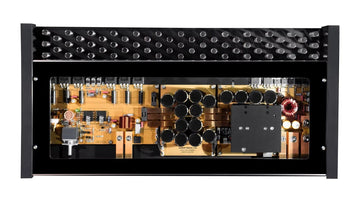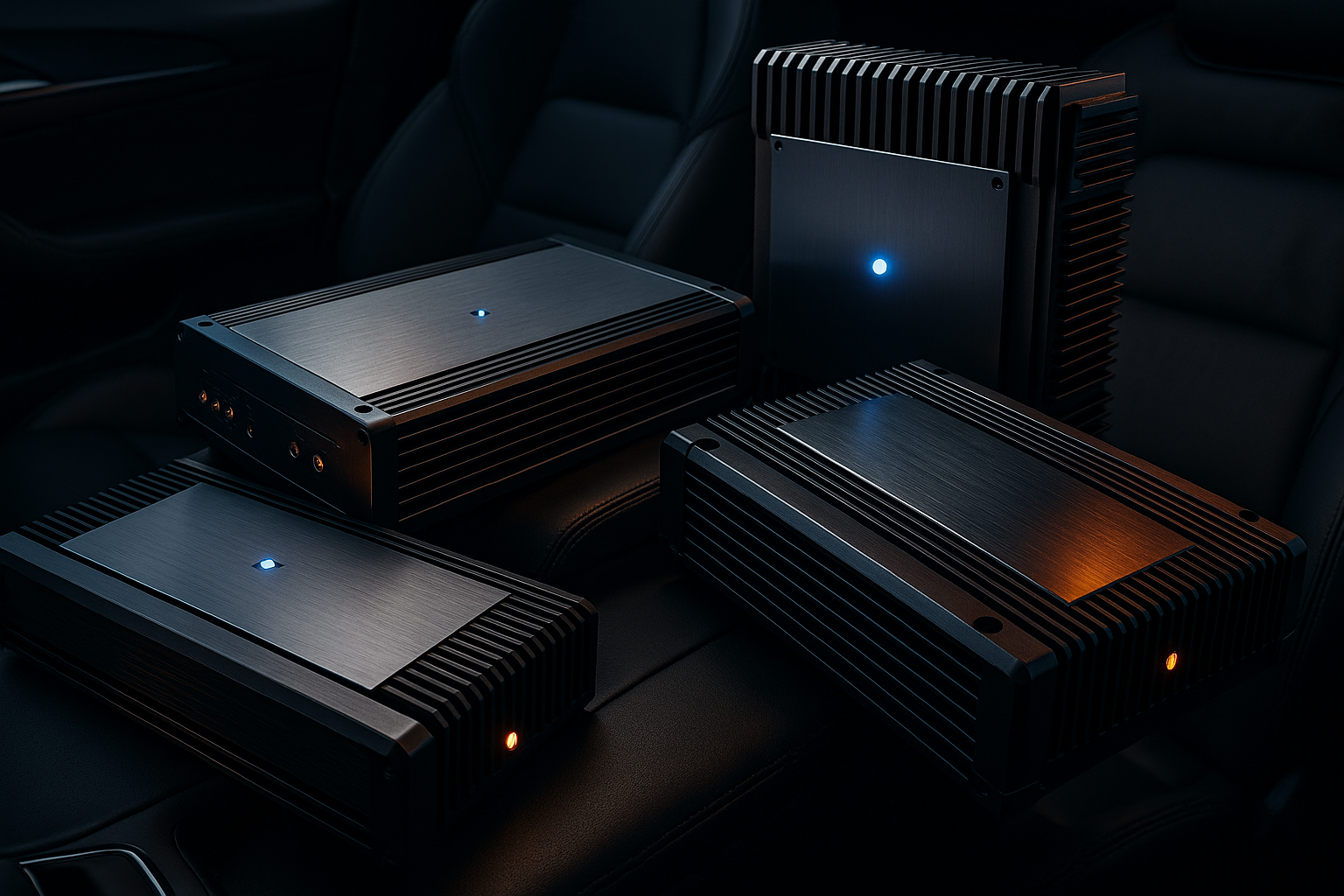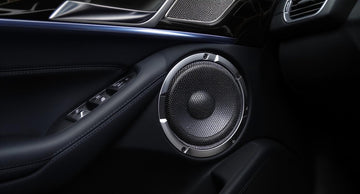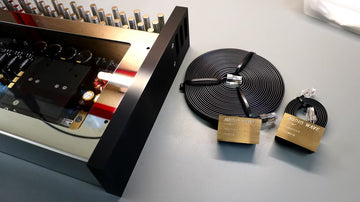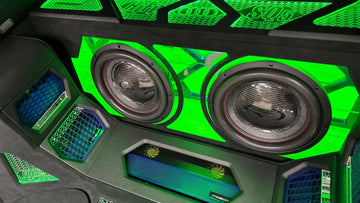
Free Shipping

Award Winning Products

778+ 5-Star Reviews

30-Day Money Back Guarantee
Clean Power for High-Fidelity Sound
Power is the lifeblood of any audio system. While factory head units often struggle to produce clean volume, a dedicated amplifier provides the headroom necessary to drive your speakers without strain or distortion. This clean signal is the key to unlocking dynamic impact, revealing the subtle details in your music that were previously lost in the noise floor.
Whether you need a massive monoblock to push your subwoofers to their excursion limits or a compact multi-channel unit to wake up your door speakers, our selection features the latest technology. From ultra-efficient Class D designs that fit under a seat to high-bias Class AB models for critical listening, we provide the foundation for a concert-level experience in your vehicle.
Channel Configuration
Discover premium car amplifiers engineered for superior sound quality and maximum power output. Our curated selection features monoblock amplifiers, multi-channel systems, and Class D technology from leading audio brands. Whether you're powering subwoofers or full-range speakers, find the perfect amplifier to transform your car audio experience.
Prodigy Audio 1200 Watt Mono Block Amplifier | NBM1200.1
Wavtech Link5001Mini
US Acoustics Mike 1500w Monoblock Amplifier
Image Dynamics SQ600.1D 600W Mono Block Amplifier
Wavtech link1000.1mini 1000w monoblock amplifier
Triton Audio NS12001 1200w Monoblock Class D Amplifier
Image Dynamics SQ1200.1D 1200W Mono Block Amplifier
Prodigy Audio 2800 Watt Mono Block Amplifier | NB2800.1
Crescendo REVOLUTION 3A1 1 channel Amplifier
US Acoustics Big Ben 3500w Monoblock Amplifier
US Acoustics Nick 2500w Monoblock Amplifier
Wavtech Link1500.1plus Amplifier - Compact 1500W Monoblock
Crescendo REVOLUTION 5A1 1 Channel Amplifier
US Acoustics Tony 6000w Monoblock Amplifier
US Acoustics Phil 8000w Monoblock Amplifier
Tru Technologies Tungsten Grande Class AB Monoblock Amplifier
Audio Wave Excel Monoblock | Full Range Class AB 1 channel Amplifier
Audio Wave CR-30X - Class A Monoblock Amplifier
US Acoustics Wendy | 2 Channel Class AB Amplifier | 2 x 75w
Rainbow Audio SL-M2 2 channel micro amplifier
Ground Zero GZIA 2.85 2-Channel High Quality Class A/B Amplifier
Ground Zero GZIA 2.135 2-Channel High Quality Class A/B Amplifier
US Acoustics Andrea | 2 Channel Class AB Amplifier | 2 x 150w
Audio Dynamics ADMK300.2 2 Channel Amplifier
Cadence XAM400.2 2-Channel Class D Powersports Amplifier - 400W RMS Orange Anodized Full Range Micro Amp
Eton Micro 120.2 2-Channel Amplifier, Class D
Ground Zero GZHA MINI TWO 2-channel class D compact amplifier
Ground Zero GZRA 2HD 2-Channel High-Performance Class D amplifier
Eton Mini 300.2 2-Channel Amplifier, Class D
Audio Wave Excel CA Class A Amplifier | Previous Demo
Tru Technologies Tungsten Grande Class AB 2 Channel Amplifier
Audio Wave Excel | 2 Channel Class AB Amplifier
Audio Wave Excel CA | 2 Channel Class A Amplifier
Audio Wave Aspire Pro V2 Class A 2-Channel Amplifier | Previous Display
Audio Wave Aspire Pro USA
TRU Technology Billet B22-A v2.5 - 2-Channel Class A Amplifier
Audio Wave Aspire Pro V2 Class A 2-Channel Amplifier
Audio Wave CR 401 Dual Mono Class AB Amplifier
US Acoustics Lisa | 4 Channel Class AB Amplifier | 4 x 50w
Rainbow Audio SL-M4 4 channel micro amplifier
Feelart AL-90.4 4 Channel Power Amplifier
Prodigy Audio 600 Watt 4 Channel Amplifier | NBM100.4
Rainbow Audio DL-A4100 4 Channel Class AB Amplifier
Xcelsus Audio DEFINIO 4 – Definio Series Class D 4 channel Amplifier - Previous Demo
Ground Zero GZIA 4.120 4-Channel High Quality Class A/B Amplifier
WavTech link300.4mini: Compact 4-Channel Amplifier
Xcelsus Audio DEFINIO 4 – Definio Series Class D 4 channel Amplifier
Xcelsus - MAGMA 220.4AB 4 channel amplifier Class AB - Previous Demo
Eton Micro 250.4 4-Channel Amplifier, Class D
US Acoustics Barbara Ann | 4 Channel Class AB Amplifier | 4 x 100w
Prodigy Audio 1200 Watt 4 Channel Amplifier | NB300.4
Wavtech link500.4mini 4 Channel Amplifier
Image Dynamics SQ800.4 800W 4ch. Full Range Digital Amplifier
Crescendo REVOLUTION 3A4 4 channel Amplifier
Rainbow Audio SL-A4150 4 channel Class AB Amplifier
Arc Audio Moto 720 4 Channel Amplifier
Eton Mini 150.4 4-Channel Amplifier, Class D
Crescendo REVOLUTION 5A4 4 channel Amplifier
Arc Audio MOTO720 4 channel Amplifier - Previous Demo
Xcelsus - MAGMA 220.4AB 4 channel amplifier Class AB
Tru Technologies Tungsten 2 Channel Amplifier
Tru Technologies Tungsten 4 Channel Amplifier
Crescendo REVOLUTION 7A4 4 Channel Amplifier
Tru Technologies Tungsten Grande Class AB 4 Channel Amplifier
US Acoustics Lanna | 6 Channel Class AB Amplifier | 6 x 150w
Audio Wave Aspire Pro 6 Channel Amplifier | Previous Demo
Amplifier Classes
Explore amplifiers by class technology - from audiophile-grade Class A precision to efficient Class D power delivery. Each amplifier class offers unique benefits: Class A for ultimate sound purity, Class AB for balanced performance, and Class D for maximum efficiency and power. Shop by amplifier class to match your specific audio system requirements.
Audio Wave Excel CA Class A Amplifier | Previous Demo
Audio Wave Excel CA | 2 Channel Class A Amplifier
Audio Wave Aspire Pro V2 Class A 2-Channel Amplifier | Previous Display
TRU Technology Billet B22-A v2.5 - 2-Channel Class A Amplifier
Audio Wave Aspire Pro V2 Class A 2-Channel Amplifier
Audio Wave CR-30X - Class A Monoblock Amplifier
US Acoustics Lisa | 4 Channel Class AB Amplifier | 4 x 50w
US Acoustics Wendy | 2 Channel Class AB Amplifier | 2 x 75w
Ground Zero GZIA 2.85 2-Channel High Quality Class A/B Amplifier
Ground Zero GZIA 2.135 2-Channel High Quality Class A/B Amplifier
US Acoustics Andrea | 2 Channel Class AB Amplifier | 2 x 150w
Rainbow Audio DL-A4100 4 Channel Class AB Amplifier
Ground Zero GZIA 4.120 4-Channel High Quality Class A/B Amplifier
Xcelsus - MAGMA 220.4AB 4 channel amplifier Class AB - Previous Demo
Ground Zero GZIA 1.700 1-Channel High Quality Class AB Amplifier
US Acoustics Barbara Ann | 4 Channel Class AB Amplifier | 4 x 100w
Crescendo REVOLUTION 3A4 4 channel Amplifier
Rainbow Audio SL-A4150 4 channel Class AB Amplifier
US Acoustics Lanna | 6 Channel Class AB Amplifier | 6 x 150w
Crescendo REVOLUTION 5A1 1 Channel Amplifier
Crescendo REVOLUTION 5A4 4 channel Amplifier
Xcelsus - MAGMA 220.4AB 4 channel amplifier Class AB
Tru Technologies Tungsten 2 Channel Amplifier
Tru Technologies Tungsten 4 Channel Amplifier
Crescendo REVOLUTION 7A4 4 Channel Amplifier
Tru Technologies Tungsten Grande Class AB Monoblock Amplifier
Tru Technologies Tungsten Grande Class AB 4 Channel Amplifier
Tru Technologies Tungsten Grande Class AB 2 Channel Amplifier
Audio Wave Excel | 2 Channel Class AB Amplifier
Audio Wave Excel Monoblock | Full Range Class AB 1 channel Amplifier
Audio Wave Aspire Pro USA
Audio Wave Aspire Pro 6 Channel Amplifier | Previous Demo
Audio Wave CR 401 Dual Mono Class AB Amplifier
Eton AM300 1-Channel Amplifier, Class D
Prodigy Audio 600 Watt 4 Channel Amplifier | NBM100.4
Prodigy Audio 1200 Watt Mono Block Amplifier | NBM1200.1
Eton Micro 120.2 2-Channel Amplifier, Class D
Audio Dynamics ADMK300.2 2 Channel Amplifier
Xcelsus Audio DEFINIO 4 – Definio Series Class D 4 channel Amplifier - Previous Demo
WavTech link300.4mini: Compact 4-Channel Amplifier
US Acoustics Mike 1500w Monoblock Amplifier
Xcelsus Audio DEFINIO 4 – Definio Series Class D 4 channel Amplifier
OnCore P-10.1 Monoblock Class D Amplifier
Prodigy Audio 1000 Watt 5 Channel Amplifier | NBM1000.5
Eton Micro 250.4 4-Channel Amplifier, Class D
Ground Zero GZHA MINI TWO 2-channel class D compact amplifier
OnCore P-5.1 Monoblock Class D Amplifier
Prodigy Audio 1200 Watt 4 Channel Amplifier | NB300.4
Ground Zero GZRA 2HD 2-Channel High-Performance Class D amplifier
Wavtech link500.4mini 4 Channel Amplifier
Image Dynamics SQ800.4 800W 4ch. Full Range Digital Amplifier
Ground Zero GZIA 1.1150D 1-Channel High Quality Class D Amplifier
Eton Mini 300.2 2-Channel Amplifier, Class D
Prodigy Audio 2800 Watt Mono Block Amplifier | NB2800.1
Crescendo REVOLUTION 3A1 1 channel Amplifier
US Acoustics Nick 2500w Monoblock Amplifier
Wavtech link1000.5plus 5 Channel Amplifier
Eton Mini 150.4 4-Channel Amplifier, Class D
Wavtech Link1500.1plus Amplifier - Compact 1500W Monoblock
Eton Stealth 7.1 DSP Amplifier, Class D
Find Your Perfect Amplifier
Not sure which amplifier fits your needs? Use this guide to quickly identify the right type, channels, and budget for your car audio goals.
| Your Goal | Recommended Type | Channels | Budget Range | Shop Now |
|---|---|---|---|---|
|
Better sound quality
|
Class AB | 2-4 Channel | $300-800 | View Class AB |
|
Add powerful bass
|
Class D Monoblock | 1 Channel | $200-600 | View Monoblocks |
|
Complete system upgrade
|
Class AB Multi-Channel | 4+ Channel | $400-1200 | View 4-Channel |
|
Audiophile perfection
|
Class A | 2-4 Channel | $2000+ | View Class A |
⚡ Quick Power Calculator
Complete Your Car Audio System
Your amplifier is just the beginning. Build the perfect sound system with these essential components that work seamlessly together. From premium speakers that showcase your amplifier's clean power to professional wiring that ensures optimal performance, we have everything you need for an audiophile-grade installation.
Premium Car Speakers
Unlock Your Amplifier's Full Potential
Transform your amplifier's clean power into incredible sound with our curated selection of premium speakers. From component sets that deliver audiophile-grade clarity to coaxial speakers perfect for factory replacement, these speakers are specifically chosen to match the power and performance characteristics of professional amplifiers. Experience the detail, dynamics, and soundstage your music deserves.
Professional Wiring & Installation
The Foundation of Great Sound
Even the best amplifier won't perform without proper wiring and installation accessories. Our professional-grade wiring kits, fuses, and mounting hardware ensure your amplifier receives clean power and operates safely at maximum performance. From complete amplifier wiring kits to specialty installation tools, we provide everything needed for a clean, reliable installation that will last for years.
System Integration & Tuning
Fine-Tune Your Perfect Sound
Take your amplified system to the next level with advanced integration and tuning components. DSP processors, line output converters, and remote controls give you precise control over your sound. Whether you're working with factory head units or building a custom system, these components ensure seamless integration and allow you to dial in the exact sound signature you want.
The Ultimate Guide to Mobile Amplification
1. Why Factory Power Isn't Enough
Most factory radios are rated for "Peak" power, which is misleading. In reality, they often produce less than 15 watts of continuous (RMS) power per channel. When you turn the volume up, the internal chip runs out of energy and "clips" the signal, sending distortion to your speakers. A dedicated amplifier solves this by providing a reservoir of clean power (50W–150W+ RMS), allowing your system to play louder, cleaner, and with greater dynamic range.
2. Choosing Your Configuration
- Monoblock (1-Channel): Designed specifically for low frequencies. These are high-current amps capable of driving 1-ohm or 2-ohm subwoofer loads.
- Multi-Channel (2, 4, or 5+): The Swiss Army knife of amps. A 4-channel amp can power your front and rear speakers, or it can be "bridged" to power front speakers + a subwoofer.
- Active Front Stage: For advanced builds, a 6-channel amp can power tweeters, mid-range, and mid-bass drivers individually, giving you total control over the soundstage via a DSP.
3. Class AB vs. Class D: The Modern Landscape
- Class AB: The traditional choice for Sound Quality (SQ). Known for low distortion and high fidelity, but they are larger and run hotter.
- Class D: The modern standard. Utilizing high-speed switching technology, these amps are over 80% efficient. They run cool, draw less current from your car’s electrical system, and are compact enough to hide behind trim panels. Modern "Full-Range Class D" amps now rival the sound quality of traditional AB designs.
4. Critical Specs: Matching Your Gear
- RMS Power: Always match the amplifier's RMS rating to your speaker's RMS handling. Ignore "Max" or "Peak" numbers.
- Impedance (Ohms): You must ensure your amplifier is stable at the speaker's impedance. For example, wiring two 4-ohm subwoofers in parallel creates a 2-ohm load. Ensure your monoblock is "2-ohm stable" (most are).
- Signal-to-Noise Ratio (S/N): Look for a higher number (90dB+). This ensures that when the music is paused, you hear silence, not hiss.
5. OEM Integration (Keeping Your Factory Radio)
You don't need to replace your dashboard radio to get better sound. Many of our amplifiers feature High-Level Inputs (Speaker Level Inputs) with auto turn-on technology. This allows you to tap directly into the factory speaker wires to feed the amplifier, bypassing the need for complex aftermarket adapters.

Car Amplifiers
Frequently Asked Questions
What size amplifier do I need for my car?
The right amplifier size depends on your speakers' power handling and impedance. For most car speakers, look for an amplifier that delivers 75-100% of your speakers' RMS power rating. For example, if you have 100W RMS speakers, choose an amplifier that outputs 75-100W RMS per channel. For subwoofers, you can safely use an amplifier with up to 150% of the subwoofer's RMS rating for optimal performance.
What's the difference between Class A, Class AB, and Class D amplifiers?
Class A amplifiers offer the purest sound quality with minimal distortion, perfect for audiophiles but less efficient. Class AB amplifiers provide a balance between sound quality and efficiency, ideal for most car audio systems. Class D amplifiers are the most efficient, running cooler and using less power, making them perfect for subwoofers and high-power applications. Most modern car amplifiers use Class D technology for their superior efficiency and compact size.
How many channels do I need in my car amplifier?
It depends on your audio setup: Monoblock (1-channel) is perfect for powering a single subwoofer. 2-channel amplifiers are ideal for a pair of speakers or bridging to power one subwoofer. 4-channel amplifiers are the most versatile, perfect for powering front and rear speakers or using 2 channels for speakers and 2 for a subwoofer. 6+ channel amplifiers are for complete system builds with multiple speakers and subwoofers.
Can I install a car amplifier myself?
Yes, many car amplifiers can be installed by DIY enthusiasts with basic tools and electrical knowledge. You'll need to run power wire from the battery, ground wire to the chassis, and signal cables from your head unit. However, for complex installations, high-power systems, or if you're uncomfortable with electrical work, we recommend professional installation to ensure optimal performance and safety.
What's the difference between RMS and peak power ratings?
RMS (Root Mean Square) power is the continuous power an amplifier can deliver safely - this is the most important rating for performance. Peak power is the maximum power an amplifier can produce for very short bursts. Always focus on RMS ratings when choosing an amplifier, as this represents real-world performance. A 500W RMS amplifier will consistently outperform a 1000W peak amplifier in actual use.
How do I choose the right amplifier for my subwoofer?
Match your amplifier's RMS output to your subwoofer's RMS power handling at the correct impedance. For example, if you have a 500W RMS subwoofer at 4 ohms, choose an amplifier that delivers around 500W RMS at 4 ohms. Also consider your subwoofer's impedance (2, 4, or 8 ohms) and ensure your amplifier is stable at that impedance. Monoblock amplifiers are specifically designed for subwoofers and offer the best performance.
What warranty comes with car amplifiers?
Most quality car amplifiers come with a 1-2 year manufacturer warranty covering defects in materials and workmanship. Premium brands often offer extended warranties up to 3-5 years. At Audio Intensity, we stand behind every amplifier we sell and will help you with any warranty claims. Always register your amplifier with the manufacturer after installation to ensure full warranty coverage.
Do I need a separate amplifier if my head unit already has one built-in?
While most head units have built-in amplifiers, they typically only produce 15-25W RMS per channel - insufficient for quality speakers or any subwoofer. A dedicated external amplifier provides 50-500W+ RMS per channel, delivering dramatically better sound quality, volume, and clarity. If you want to truly experience your music with proper bass and clear highs, an external amplifier is essential for any serious car audio system.
Related Articles

Step‑by‑Step Guide on How to Install Amplifier in Car

How to Set Amplifier Gain: A Practical Step-by-Step Guide
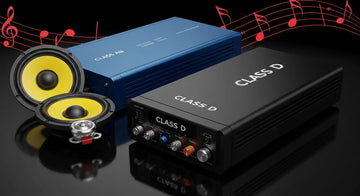
Class AB vs Class D Amplifiers: Which One Should You Choose?
